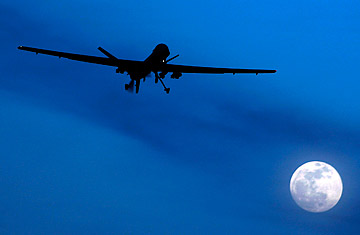
A Predator drone flies above Kandahar Air Field in southern Afghanistan
The Obama Administration's new military strategy in Afghanistan may be a sign of desperation — a Hail Mary pass — but it may just work. The President's counterterrorism adviser John Brennan describes it as giving up the hammer for the scalpel. The military, as we know from classified military documents put on the Internet by WikiLeaks last month, prefers the term kinetic strike. I've heard the Pentagon use the term eliminating command nodes. But I'll go ahead and call it by its everyday name: assassination.
The tactic is familiar in the war on terrorism, of course, its template being the CIA's unmanned-aerial-vehicle strikes on al-Qaeda operatives in the tribal areas of Pakistan — another form of assassination. Putting aside questions of the long-term wisdom of firing area weapons into small villages, no one has convincingly disputed the fact that these strikes have badly hurt al-Qaeda, with its remnants either hiding in caves or fleeing to places like Yemen. Not surprisingly, the military has asked, Why can't we do the same in Afghanistan?
An official back from Washington told me I'd be surprised at the extent to which my former colleagues in the CIA are caught up in this new Afghan strategy, the agency having turned itself into a paramilitary operation at the service of the military. The CIA in Afghanistan wakes up in the morning and goes to bed at night thinking about how it can better guide Brennan's scalpel. It has even adopted a new term for officers helping the military — targeters. But the flaw in the new strategy remains the availability of good, solid intelligence.
The first assassination I ever looked into in depth was that of Bashir Gemayel, Lebanon's Christian President-elect who was killed along with 26 others by a bomb attack on his Phalange party's headquarters Sept. 14, 1982. What was apparent from the beginning was that the assassins had fantastic intelligence. They not only had people continuously watching Gemayel right up until the moment they detonated their bomb; they also had unimpeded access to the building in which Gemayel was killed. The assassins did not intend to miss, because for them assassination is a form of intimidation — a message to Gemayel's party that if it continued cooperating with the Israelis, who had invaded Lebanon, the rest of the party's leadership would meet the same fate. It worked. Gemayel's brother Amine, who succeeded him, gave up any idea of cooperating with Israel.
That's pretty much what we'd like to do in Afghanistan: decimate the Taliban's leadership, and force the survivors to put down their arms. But Afghanistan isn't Lebanon. For a start, there is no single leader of the Taliban. How many Taliban commanders would we have to kill before the Taliban was intimidated? Fifty? A hundred? We don't know the Taliban well enough to put a number on it. Second, what's clear in Afghanistan is that while our military is more than capable of wielding a scalpel, we don't have the intelligence to point out where to strike. We saw evidence of this in the WikiLeaks documents on the failed assassination attempt of al-Qaeda operative Abu Laith al-Libi in Afghanistan. It underscores the problem that the Taliban is possibly the most elusive military force in the world. Unlike with the Gemayel assassination, there simply is no way for us to keep our eyes on a target right up until the assassination, let alone get access to wherever he's hiding.
Like any Hail Mary pass, we'll just have to wait and see whether the play works.
Baer, a former Middle East CIA field officer, is TIME.com's intelligence columnist and the author of See No Evil and, most recently, The Devil We Know: Dealing with the New Iranian Superpower.
